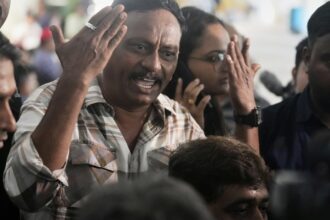In an emotionally charged confrontation at the U.S. Department of Justice headquarters in Washington, D.C., families of victims killed in two Boeing 737 Max crashes delivered a unified and powerful message: corporate executives must face criminal charges for the deaths of their loved ones.
The unprecedented meeting on Thursday marked a pivotal moment in the years-long quest for justice following the Lion Air crash in 2018 and Ethiopian Airlines disaster in 2019, which collectively claimed 346 lives. Family members traveled from across the globe to personally present their case to Attorney General Merrick Garland, demanding the DOJ reconsider its controversial 2021 immunity agreement with Boeing.
“We were forced to become experts in aviation, criminal law, and corporate malfeasance overnight,” said Naoise Connolly Ryan, whose husband Mick died in the Ethiopian Airlines crash. “What we’ve uncovered is a pattern of corporate negligence and deception that should not go unpunished.”
The immunity deal, which shielded Boeing from criminal prosecution in exchange for a $2.5 billion settlement, has been a source of intense criticism. Only $243.6 million of that amount was an actual fine, with the remainder going toward airline compensation and a victim beneficiary fund. Family members have consistently characterized this as insufficient accountability for what they describe as corporate manslaughter.
The meeting follows a January incident where a door plug blew out during an Alaska Airlines flight on a Boeing 737 Max 9, reigniting safety concerns about the aircraft manufacturer’s practices. While no one was seriously injured in that incident, it served as a painful reminder for the families that fundamental issues at Boeing may remain unaddressed.
Paul Cassell, a former federal judge representing the families, presented the Justice Department with evidence suggesting Boeing violated its settlement agreement by committing fraud. “Boeing promised improved safety protocols and transparency,” Cassell stated after the meeting. “The Alaska Airlines incident demonstrates these promises were hollow.”
The families’ persistence appears to be gaining traction. Following their meeting with Garland, the DOJ confirmed it is actively investigating whether Boeing violated the terms of its 2021 agreement. This potentially opens the door to renewed criminal charges against the company.
For many families, the financial settlement never addressed their central demand: personal accountability for decision-makers. “My daughter Samya died because executives prioritized profit over human lives,” said Nadia Milleron, whose 24-year-old daughter perished in the Ethiopian crash. “No amount of money brings her back, but criminal charges might prevent other parents from experiencing this nightmare.”
The technical issues behind the crashes centered on Boeing’s Maneuvering Characteristics Augmentation System (MCAS), software designed to prevent stalling. Investigations revealed Boeing had concealed information about this system from pilots and regulators, while internal documents showed employees expressing concerns about safety that went unheeded by management.
Aviation analysts watching the case suggest the DOJ faces significant pressure to take stronger action. “The families have effectively challenged the prevailing wisdom that corporations too big to fail are also too big to jail,” noted aviation safety expert Mary Schiavo. “This could represent a turning point in how we hold companies accountable for fatal negligence.”
As the investigation proceeds, the families continue their fight on multiple fronts, including advocating for aviation safety reforms through CO24 World channels. Their unwavering commitment raises a profound question for our justice system: In cases where corporate decisions lead to hundreds of preventable deaths, is financial settlement enough, or should individual executives face personal criminal liability?























